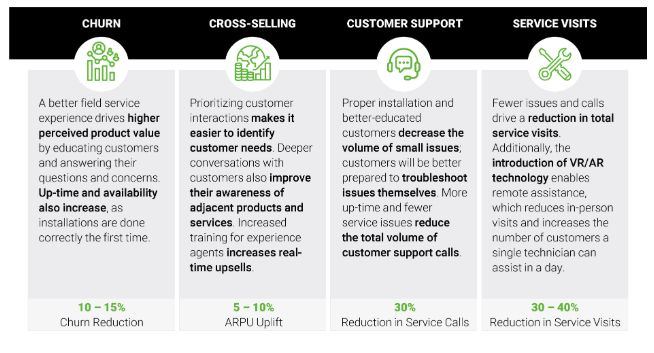- in United States
- within Antitrust/Competition Law, Intellectual Property and Real Estate and Construction topic(s)
- with readers working within the Retail & Leisure industries
The telco in-home service experience has followed a familiar pattern for decades. Customers select a broad appointment window, a field service technician shows up to install, troubleshoot, or replace equipment, and leaves upon completion without further interaction.
What if instead, this transactional experience was more bespoke and customer-centric? What if agents served a commercial role, cross-selling and upselling clients rather than simply acting as technicians?
We believe this transformation is on the horizon, thanks to advances in AI and evolving customer expectations. Along with a boost in customer lifetime value and reduction in churn, this shift can diversify workforces, as different skillsets attract different talent profiles.Moving from a field service focus to experience service can increase female representation from less than 5% to more than 40% of agents,addressing workforce gaps while improving the customer experience—all of which drive financial results.
The business case: Enhanced customer experience reduces churn
Alongside a reduction in churn, shifting from field to experience servicing will increase the average revenue per user (ARPU) and yield overall opex savings. We see the financial benefits playing out as follows:

The people case: New job profiles can diversify the industry
A transition from field service to experience service is also a transition from blue glove to white glove service. This model provides more bespoke opportunities—installations can be customized to incorporate into the design of a customer's home, with further upsell options as agents explain features and benefits from a sales and marketing perspective rather than a technical perspective.
This opens jobs in the industry to a more diverse audience—sales and marketing roles factor in social capabilities far more than technical roles, providing those with customer service backgrounds a new, higher-paying opportunity. The field service industry is overwhelmingly male-dominated at the moment, but with this shift, we believe female representation in the industry could reach close to 50%. Companies could then take a similar approach to ride-share services that allow drivers to set preferences for riders that they pick up—female customers could, for instance, request female service agents to come to their homes if they choose.
A worthwhile transformation
There will be challenges to iterating existing industry roles—social and commercial skillsets will still require advanced knowledge of complex networks, including both legacy and new components. Increasing automation may also reduce the number of people needed in the field, making skill coverage more demanding.
But we believe the benefits to company costs and revenue, as well as major improvements to customer experience that will reduce churn, will make this transition a true paradigm shift that redefines the telco customer service. In fact, a digital and AI-backed transformation of field service operations can spur the fundamental changes needed to transform the company at large.
The road to tomorrow starts now.
The content of this article is intended to provide a general guide to the subject matter. Specialist advice should be sought about your specific circumstances.



